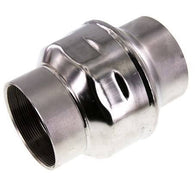Collection:Stainless Steel 304/316 Check Valves
Stainless Steel 304/316 Check Valves are essential components designed to prevent backflow in various piping systems. These valves are crafted from high-quality stainless steel, specifically gra... Read more
Stainless Steel 304/316 Check Valves

Stainless Steel 304/316 Check Valves are essential components designed to prevent backflow in various piping systems. These valves are crafted from high-quality stainless steel, specifically grades 304 and 316, ensuring durability and resistance to corrosion. They are ideal for applications in industries such as chemical processing, water treatment, and food and beverage production, where maintaining the purity and integrity of the flow is crucial.
The primary function of Stainless Steel 304/316 Check Valves is to allow fluid to flow in one direction while automatically preventing reverse flow. This is achieved through a mechanism that closes the valve when the flow reverses, protecting equipment and maintaining system efficiency. These valves are available in various sizes and configurations, including swing check valves, lift check valves, and wafer check valves, each suited to specific flow conditions and installation requirements.
When selecting Stainless Steel 304/316 Check Valves, consider the operating pressure and temperature of your system, as well as the type of fluid being transported. Stainless Steel 304 is suitable for general applications with moderate corrosion resistance, while Stainless Steel 316 offers enhanced resistance to chlorides and acidic environments, making it ideal for more demanding conditions. Additionally, ensure compatibility with existing piping and fittings to guarantee a secure and leak-free installation.
Overall, Stainless Steel 304/316 Check Valves provide reliable performance and longevity, making them a valuable investment for maintaining the efficiency and safety of your fluid handling systems. By understanding the specific needs of your application and choosing the appropriate valve type and material, you can optimize system performance and prevent costly downtime.



